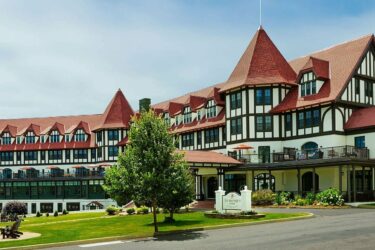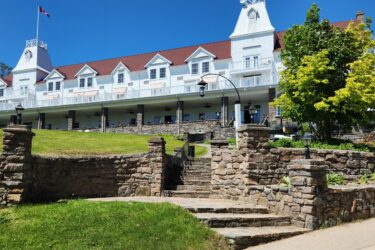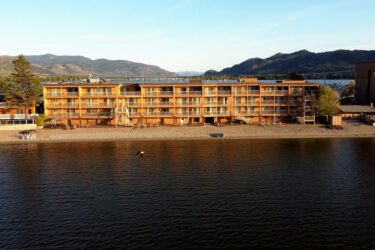
InnVest Hotels acquires The Algonquin Resort St. Andrews by‑the‑Sea, Autograph Collection and The Algonquin Golf Course
InnVest Hotels has acquired The Algonquin Resort St. Andrews by-the-Sea, Autograph Collection and The Algonquin Golf Course.
By Colleen Isherwood, Editor TORONTO — While the Canadian Hotel Investment Conference (CHIC) has been postponed until the fall, CHIC Digital presented the first in a series of webinars, titled Government Support and Financing Your Hotel and Resort Assets from COVID-19 to Recovery. The webinar, which took place today at 1:00 pm EST, was designed to help […]

By Colleen Isherwood, Editor
TORONTO — While the Canadian Hotel Investment Conference (CHIC) has been postponed until the fall, CHIC Digital presented the first in a series of webinars, titled Government Support and Financing Your Hotel and Resort Assets from COVID-19 to Recovery.
The webinar, which took place today at 1:00 pm EST, was designed to help Canadian hotel and resort owners better understand and navigate the different government funding options available to them during these trying times, and find the best and quickest ways to access capital for hotel and resort operations.
David Larone, senior managing director at CBRE hotels, moderated a panel that included Susie Grynol, president, Hotel Association of Canada; Laurie Jessome, partner, Cassels, Brock & Blackwell LLP; Ed Khediguian, senior VP, CWB Franchise Finance; and Greg Prince, partner, corporate advisory and restructuring leader, PwC Canada.
The overarching theme of this series will be to assist owners through these tough times to the point of solid recovery. The initial focus will be on immediate government funding sources, with the series quickly morphing to address successful strategies for working with your lender and other stakeholders, as well as the evolving refinancing and recapitalization options available to you.
“We want to work alongside you as the market resets itself and connect you with some of the best informed industry representatives in the Canadian hotel space,” the CHIC organizers said in their invitation.
Governments have turned on a dime in order to come up with programs that usually would have take 12 to 18 months to develop — the hotel sector’s role is to fine tune these programs so that they benefit hoteliers to the max. Susie Grynol, president of the Hotel Association of Canada noted that the hotel sector got in on the process with early data and early analysis, and helped sound the alarm bells regarding the carnage that was coming for the entire economy. One of the biggest barriers the hotel sector faced was the misconception that it was made up of large U.S. brands with deep pockets. In most cases, it’s not the brands that own hotel properties, but rather small and medium size businesses across the country. HAC relied on its members to help spread that message to the media and to develop policies. HAC has also teamed up with organizations like TIAC, Restaurants Canada and Chambers of Commerce. “Our efforts are working,” Grynol told the panel “We’re overindexing on our ability to influence government policies.”
Grynol and others talked about the new programs: the EDC which has been rolled out; and the BDC, which is several weeks away. The EDC Guarantee for SMEs provides up to $6.25 million, 80 per cent guaranteed by EDC, to be repaid within one year and is for covering payroll and operational costs. The BDC Co-Lending Program for SMEs also provides up to $6.25 million, with differing maximum finance amounts based on business revenues. Eighty per cent of the finance amount is provided by BDC and the remaining 20 per cent by the company’s financial institution. It is to be used for operational cash flow requirements and is available up until or before Sept. 30, 2020.
Ed Khediguian of CWB Franchise Finance said these programs are only good for companies that were in good standing and had viable businesses before COVID-19. The institution has to underwrite the fact that the borrower can pay the money back within 12 months — the company can get an extension, but it would have to re-underwrite and reapply 30 days before to get the 12-month extension. For most businesses to repay the loan within 12 months is not realistic, Khediguian said. It’s only for strong owner-operators.
HAC would like to see the BDC and EDC streamlined so that the funds are forgivable.
The panel’s consensus is that the industry needs relief, not just more debt.
More debt isn’t the answer, said Greg Prince of PwC Canada. “Eventually it comes down to, ‘Can you lend me more money.’ There’s a health crisis that’s causing more debt, and we are sowing the seeds for tomorrow’s insolvencies.
“I think we’ll see a lot of opportunistic acquisitions, assets that are up for sale or change hands. Which assets are higher in demand than others? Which regions are more under duress? When you have scarce resources, you have to save certain assets and hope for the best with others. If owners put more leverage on assets, there will be a lot of distressed transactions happening in the very near term.”
Laurie Jessome of Cassells, Brock & Blackwell LLP addressed the employment side of the hotel business. She noted that the COVID-19 Wage Subsidy that just opened up yesterday has been well-received. It allows companies to start calling employees back to work. Seasonal businesses can take advantage of the fact that the program has two potential reference points — companies can either compare their revenues to January/February 2020, or look at a comparable period last year.
Jessome is surprised that the CERB program, which provides $500 per week for up to 16 weeks for If people have stopped working because of COVID-19, has turned out to be such a temptation for employees. “It very rarely covers what they get at their job, and it’s taxable. It’s not free money,” she said. The program is open to anyone who has stopped working because of COVID-19 — a very broad definition.
The panel also addressed the fact that a COVID-19 vaccine may be 18 months or longer away, and that “normal” will not be the same during that period.
“The consumer confidence piece needs to be addressed,” said Grynol. There may be new cleaning protocols and third party verification of those protocols. If there’s a need for plexiglass screens at the front desk, or COVID testing in the hotels, who should pay for it? Will hotels have to pick up those costs when they are already in life or death circumstances? “The recovery will be a phased approach, and the new normal will look different until we get a vaccine,” she said.
Jessome sees more legislation governing workplace safety, with regulations from provincial governments regarding the amount of personal working space employees require, sanitization, hand washing stations, provisions for people who are dealing with soiled linens, and those who have personal contact with guests.
“Most downturns involve orderly re-leveraging consistently through the cycles,” but this one is different due to the velocity and depth, noted Khediguian. The financial sector learned lessons from 2008, meaning that sector is better positioned to handle this crisis. “It’s a question of survival. There’s a ton of creativity in the sector. Interest rates continue to be low, and governments will respond.”



InnVest Hotels has acquired The Algonquin Resort St. Andrews by-the-Sea, Autograph Collection and The Algonquin Golf Course.

The new owners of the famed Windermere House hotel and resort on Muskoka’s Lake Rosseau intend to revitalize the building and its amenities while preserving the property’s historical integrity.

Proactive Hospitality has acquired the Coast Osoyoos Beach Hotel, B.C. CFO Capital arranged acquisition financing for the deal.

Tribute Portfolio – part of Marriott Bonvoy's extraordinary portfolio of 31 hotel brands – continues to grow its global family of characterful hotels with Honeyrose Hotel Montreal, a Tribute Portfolio Hotel, the brand's…